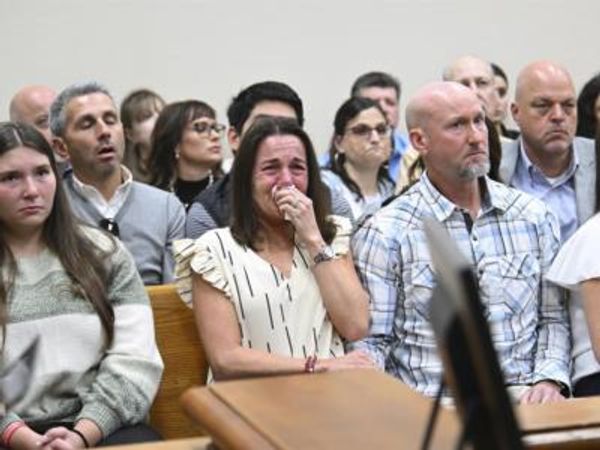
Washington (AFP) - A cross-party group of US senators were in talks Thursday on a narrow package of firearms controls, as lawmakers face calls to tackle soaring gun violence after recent massacres in Texas and New York State.
Nine senators have been meeting this week to discuss a response to the mass shootings that have appalled the nation, projecting optimism over the prospects for modest reforms.
The group has focused on school security, bolstering mental health services and incentives for states to grant to courts "red flag" authority to temporarily remove guns from owners considered a threat.
Moderate Republican Susan Collins said the group was making "rapid progress" while Democratic Senator Chris Murphy said he had "never seen more Republicans at the table willing to talk."
President Joe Biden was to address the nation Thursday night on the need for "commonsense" gun laws, in what his spokeswoman billed as "a call to action for Congress" in the wake of the latest bloodshed.
Even as lawmakers were mulling responses to the racist murders of 10 Black supermarket shoppers in Buffalo and a school shooting in Texas that killed 19 children and two teachers, another attack took place in Oklahoma on Wednesday.
A man with a pistol and a rifle murdered two doctors, a receptionist and a patient in a Tulsa hospital complex before killing himself as police arrived.
Lawmakers are aware that they risk wasting momentum as the urgency for reforms sparked by the killings dissipates, and another smaller group of senators is holding parallel discussions on expanding background checks on gun sales.
The political challenge of legislating in a 50-50 Senate, where most bills require 60 votes to pass, means that more wide-ranging reforms are unrealistic.
Mitch McConnell, leader of the Senate Republicans, told reporters that senators were trying to "target the problem" -- which he said was "mental illness and school safety" rather than the availability of firearms.
'Brutal attacks'
House Democrats are nevertheless set to pass a much broader but largely symbolic "Protecting Our Kids Act," which calls for raising the purchasing age for semi-automatic rifles from 18 to 21 and a ban on high-capacity magazines.
"All of us who have had the solemn privilege of visiting with survivors in the wake of brutal attacks know that they want us to stop this from happening again," Democratic House Speaker Nancy Pelosi said in a letter to colleagues.
"They want us to succeed in making progress."
The package will likely pass the Democratic-led House next week before dying amid Republican opposition in the Senate.
Republican Congressman Greg Steube, who was attending a Judiciary Committee hearing on the package virtually from his home, startled fellow lawmakers when he pulled out a number of handguns.
"I hope that gun is not loaded," said Texas Democrat Sheila Jackson Lee.
"I'm at my house.I can do whatever I want with my guns," Steube replied.
With regulation being so difficult at the federal level, an effort is also underway among state legislatures to push for tighter gun laws.
California lawmakers advanced a gun control package in the aftermath of the Uvalde shooting that included proposals to open up gunmakers to civil legal liability in certain cases.
"While the US Senate stands idly by and activist federal judges strike down commonsense gun laws across our nation, California will act with the urgency this crisis demands," Democratic Governor Gavin Newsom said.
The proposals echo action by lawmakers in New York state, while permit-to-buy bill is moving through the Delaware legislature and pro-gun rights Texas is looking to "make legislative recommendations" in response to the Uvalde shooting.
Activists for greater restrictions fear a setback at the federal level however as the Supreme Court is set to issue its first major Second Amendment opinion in more than a decade.
Justices are expected to rule in the coming weeks in a dispute over New York state's stringent limits on the concealed carry of handguns outside the home.
A narrow opinion could affect just a few states with similar laws, but campaigners fear the conservative majority will make a broader ruling clearing the way for constitutional challenges to gun safety laws across the country.







